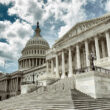The American Republic is ripe for a hostile takeover. In the go-go 1990s — when “the end of history,” the primacy of market economics and galloping globalization were dominant metaphors for elite commentators — a joke circulated around the Goldman Sachs trading floor that it was high time to take the United States of America private. A one-man variant of that takeover scenario — surreal maybe, but no joke — may be unfolding today.
In the space of a short tempestuous decade one of the two major institutional parties has been steadily and decisively taken over by Donald Trump and his MAGA insurgency.
The roots of this trend lie with Speaker Newt Gingrich’s “Contract with America” of the 1990s and the Tea Party movement of the early 2010s and the Freedom Caucus at national and state levels, but the full-bore takeover of the Republican Party would wait until Trump’s nomination and the dawn of his presidency. Trump has strengthened his control since leaving office.
It is not an especially long step from the hostile takeover of a major political party, which represents a core institution of civil society, to the takeover of the entire state.
If such a scenario comes to pass, it would not be the result of some process of nature or the inevitable collapse of democracy. Nor would it be primarily due to meddling by Vladimir Putin or Xi Jinping or other nefarious foreign plots, though they could play supporting roles in pre-election misinformation, subversion and even physical sabotage.
Rather, it would be the product of the deliberate, willful plan of a home-grown American demagogue and his core followers which could potentially even get buy-in and a mandate from a majority of American voters, or at least from the electoral college.
In a notable recent commencement address, popular history documentarian Ken Burns quoted a young Abraham Lincoln from his Lyceum Speech of 1838 addressing the country’s mounting civil strife over slavery and mulling over “the perpetuation of our political institutions. Lincoln said, “If destruction be our lot, we must ourselves be its author and finisher. As a nation of freemen, we must live through all time, or die by suicide.”
This is apparently something on which Lincoln and Trump agree: to wit, the most dangerous threats to the perpetuation of our polity are in our own backyard.
Trump has often commented on the supposedly dire threat of certain domestic enemies who are supposedly taking the country to a breaking point. For example, Trump said in an interview referring to Democrats: “These people are sick. They’re sick. They’re deranged,” he said. “You know, I talk about the enemy on the outside and the enemy from within. So you have Russia, you have China — if you have a smart president, you always handle them quite easily, actually. We have a lot of advantages. But the enemy from within, they are doing damage to this country.”
Trump rarely hides his intentions — either by design or Freudian slip he reveals what’s on his mind — in this case, elimination of “the enemy from within.” Looking in the mirror is not his strong suit. If it were, Trump would see that his own political movement poses the greatest threat to the cohesion of the Nation and our system of governance since the Civil War. Trump is the threat — the internal enemy — of which he warns.
It is telling that, to describe their revisionist plans for the country, Trump and his associates have used the Civil War code name “Come Retribution” for the Confederate plot to assassinate Lincoln. This ominous code is part of the Trump movement’s symbology of struggle. Justice Samuel Alito’s inverted U.S. flag is another example of secret signs of solidarity with the January 6 rebels and support for overthrowing the government. Not so long ago, Republicans were outraged when an NFL quarterback took a dissenting knee during the national anthem; where is the outrage at Justice Alito’s disrespect for the flag he serves?
Our purpose in this series of “Dancing in the Dark” pieces — here and here — has not been to forecast electoral outcomes but to forewarn about plausible electoral derailments and the consequences.
We are not predicting how the presidential election will go — either candidate could win a free and fair vote outright, or it could be exceedingly close as in 2020, 2016 and 2000 as most polls suggest. Rather, we are highlighting the unprecedented risk that the election itself might not matter; that constitutional and other legal vulnerabilities in the Federal electoral process and the transition make an anti-democratic takeover possible; and that a radical political movement is redoubling its efforts to take advantage of those vulnerabilities, to seize control of the state and unleash expansive, unchecked presidential powers to crush domestic enemies including media critics.
The unsettling implication is that what the 19th-century German philosopher Friedrich Nietzsche, who extolled the “great man” view of historical progress, called “the will to power” could prevail over process and principle, even in America. It’s a grim prognosis for a democratic republic. In Nietzsche’s words, “Democracy represents the disbelief in all great men and in all elite societies: ‘Everybody is everybody else’s equal, at bottom we are all herd and mob.’”
Taken perhaps too literally, Nietzsche’s philosophical musings inspired the Nazi movement in Germany in the 1920s and 1930s. Today we have our own Nietzscheans in America. This group is intellectually in phase with the German philosopher’s view of the special calling of the elite leadership class: “a race of masters whose sole task is to rule… beyond good and evil.”
As but one prominent example of an American Nietzschean, The New Yorker reported that the mega-billion tech entrepreneur Peter Thiel is an aficionado of the German philosopher. Following the theme of Will to Power, Thiel has concluded, “I no longer believe that freedom and democracy are compatible.” This means freedom for the global super class of great individuals of which he is a member.
Equally directly, Nietzsche put the deeper political meaning of his suprematist philosophy as follows: “Terribleness is part of greatness: let us not deceive ourselves.”
Is America prepared for a reign of terribleness? In his earlier cited speech, Ken Burns, who is an exceptional chronicler of our country’s best and worst chapters and traits, makes an astute observation about how the “isolation of two oceans” has led to American “certainty about everything” and to American exceptionalism. But in fact, Burns implies, American political culture is of a piece with the rest of human experience. As a nation, we are not immune from human nature, its glory and its folly, and we do not exist outside of history.
The resilience of our system of governance — the perpetuation of “a system of laws not men” — is being put to the test by the terribleness of a self-anointed “great man.” It will require the good will and hard work of many millions of men and women — officials, community leaders and voters alike — to defend that venerable system if we wish to preserve it.
The starting point — a necessary but not sufficient condition for defense of democracy — is awareness of the threat. It is reassuring, depressingly so, that a growing number of mainstream observers and commentators have been calling out the ominous patterns of an emerging power play by Trump and his backers.
To enumerate several of the key interlocking elements in the pattern of Trump’s incipient strategy and intent:
First, chaos is king. Helter-skelter is the tool of choice. Trump counts on chaos as an enabling environment for takeover. When GOP candidate former S.C. Governor Nikki Haley briefly hit her stride on the short-lived campaign trail, she archly quipped of Trump that “chaos follows him.” That’s true. But, equally important, chaos doesn’t only follow Trump, it precedes him. It’s a tool of his hybrid warfare, in the arsenal of tactics to gain power. As the seasoned revolutionary Mao Zedong observed, “Everything under heaven is in utter chaos; the situation is excellent.”
Second, volatility and velocity are the midwives of chaos, so we should expect unprecedented tactical aggression throughout the campaign season, which effectively starts with the first Presidential debate on June 27. No week will be quiet, no two weeks will be the same. Trump embraces a form of politics known as “decisionism” — just do it and keep the other side guessing. This way, he calculates, he can outrun the opposition and the justice system — and the media — and keep voters in suspense. Trump practices the art of coup by fait accompli. Don’t ask, just act. Trump’s ruthlessness must not be underestimated.
Third, there is no return. For Trump and some of his closest allies, the choice is the White House or the jail house. It’s clear that the run-up to January 6 had the hallmarks of a wide-ranging criminal conspiracy. There can be little doubt that an even more intense and elaborate degree of plotting is under way today. It is noteworthy that GOP Rep. Elaine Stefanik has repeatedly interrogated FBI Director Christophe Wray in House Select Intelligence Committee hearings as to whether the FBI is conducting counter-intelligence investigations into either campaign. (What is she concerned about?) Nor is it an idle threat on Trump’s part to prosecute the Bidens, the Obamas and other key Democrats as well as media enemies once he comes to power again. Trump is throwing the White House/jailhouse choice back to his opponents. After all, according to Trump, this is “the final battle.”
Fourth, strike preemptively when it comes to the election. Trump might try to hijack an election he could have won fairly. In other words, the takeover can happen at the ballot box, or despite the ballot box. It has been said that January 6 was a dress rehearsal for the next coup. One lesson the revisionists learned from the 2020 election is not to wait; instead, it’s imperative to obstruct the process and contest the counting immediately. On election night 2020, surprised that his internal pollsters were wrong, Trump blinked and did nothing while the votes were being counted and canvassed. This time, he knows it’s safer to subvert the election than to risk losing a close count. (Our first piece examined several specific pathways to perdition via constitutional coup, but there are others.)
Finally and most fundamentally, we’re talkin’ about a kind of revolution, not a traditional political campaign. Trump and his movement will continue to invoke revolutionary justice to legitimize their promised excesses. As a felon and criminal indictee, Trump has nowhere else to go but to claim a higher purpose. In this view Trump may be guilty before the corrupt system at hand, but he is more than innocent from the perspective of national salvation. To his most ardent supporters, he is the secular savior who must be vindicated and will be vindictive.
The revolutionary aspect of the Trump movement merits deeper analysis. Indeed, the rhetoric of this revisionist movement echoes the tropes of “national salvation fronts” seen in many countries in the ashes of the twentieth century — fueled by grievances about inequality, resentment against technological, financial and political elites and a desire to reverse societal decadence and embrace fundamentalist mythologies. Decrying multicultural “identity politics” on the Left, today this movement embraces identity politics of cultural and ethnic purity, xenophobia and isolationism.
A national salvation platform typically seeks to save a country from itself, from its people, from decadence, from decline — and from democracy. It is a form of secular liberation theology claiming a higher mandate of urgency and revolutionary justice above constitutional norms. One of Trump’s former OMB officials has explained that “we are already beyond the constitution” due to the predations of the Democrats since FDR. Indeed, false equivalence is coin of the realm for the Trumpists: even as they plan day-one invocation of the Insurrection Act after inauguration to authorize virtually unlimited presidential powers, including deployment of the military internally, they denounce Biden as a dictator for using executive discretion to forgive student loan debt. Hardly an equivalent.
It is no accident that Trump and his January 6 confederates are mired in dozens of criminal convictions and ongoing prosecutions yet claim to be political martyrs crucified for their beliefs. They seem to believe that a higher standard of justice applies to themselves than to the rest of us.
Trump has no ideology save the idea of his own power. But he is a crafty unifier of the disgruntled, an assembler of the disparate ideologies of White nationalism, Christian Evangelism, ultramontane Catholicism, protectionism, isolationism and libertarianism. The transactional Trump gives each ideological cause more red meat on their particular issues than they have ever dreamt from a national politician.
Lurking powerfully behind the national salvation agenda is a Nietzschean worldview that combines suprematist libertarianism and its cousin neoliberalism — the notions that the regulatory state and its institutions should get out of the way of the dynamic spirit of creative, talented and wealthy individuals. The priority is to make markets safe from democracy. The state should either wither away if it’s inconvenient or be a tool at the disposal of the elite when it’s useful.
The writings of guru of the Austrian economics school Friedrich Hayek such as The Constitution of Liberty as well as the collected works of Milton Friedman — who inspired Margaret Thatcher and Ronald Reagan in the late 1970s and 1980s — remain the canonical texts of today’s ultra libertarian elite, including the techno-superheroes of Silicon Valley.
The libertarians and neoliberals have usually assumed that the efficient logic of market forces will automatically protect society from the predations of tyranny, ultranationalism and violence. This delusion is clear in the comments of important people like JP Morgan’s Jamie Dimon who assured the Davos elite that he could “deal with” a return of Trump.
As Yale business professor Jeff Sonnenfeld has warned, if given a second chance in power, Trump’s populism is likely to undermine the big capitalist business interests he is trying to attract, but they may not fully appreciate the threat.
One is reminded of English poet Oliver Goldsmith who put the matter crisply: “Ill fares the land, to hastening ills a prey, where wealth accumulates and men decay.”
Latter-day libertarians echo Hayek’s comment to El Mercurio after meeting with Chilean dictator General August Pinochet in 1981 that “personally I prefer a liberal dictator to democratic government lacking liberalism” by which Hayek meant a government without neoliberal laissez-faire policies.
It’s not that these neoliberal and libertarian critics of “socialism and statism” lack plausible arguments about an array of policies, domestic and foreign, but they are often too ready to reduce politics to economics — usually defined as profit for their interest groups — and thus to tolerate come-what-may tactics to achieve their objectives. They exhibit little or no sense of a public good beyond common defense and narrow economic efficiency. In this respect they are not so different from the Marxist revolutionaries whom they abhor. The Marxists see only the upside of equality, while the libertarians see only the upside of liberty.
In their Trumpian form, these radicals are philosophically united in their opposition to the center ground, to the inconvenience of negotiation and compromise, to give-and-take within the accepted rules and guardrails of the democratic game — all of which have become more, not less, imperative as societies have grown more diverse and complex. All of which are also at the heart of the American Republic’s almost 250-year-old experiment in self-government based on principled pragmatism.
Exemplifying this spirit of muscular libertarianism, the flame-out former UK Prime Minister Liz Truss recently boasted in her memoir of a few weeks in office that she does “not believe in guardrails.”
Along the same lines, upstart Argentine President Milei’s colorful campaign prop was a chainsaw supposedly illustrating how he would do away with the wrongheaded policies of “statists and socialists,” apparently including the Jesuit Pope Francis, who had ruined Argentina over decades. To his credit, Milei has turned out more pragmatic in office than in his bombastic campaign rhetoric.
The U.S. has joined the ranks of troubled democracies, each unhappy in its own way, such as Narendra Modi’s India, Viktor Orban’s Hungary, and Bukele’s El Salvador (where the MAGA movement just convened, as they have done in Budapest before). Like the Communist International of the middle of 20th century, MAGA has built an international fraternity of nationalist radicals and authoritarians.
To be sure, the picture is far from monolithic as recent elections in India and the European Union have revealed. On one hand, in June popular voting rejected Modi’s seemingly ineluctable march to a super majority; on the other, far-right parties have surged in the Europe parliament, taking leading positions in Netherlands and Austria and humiliating the centrists in power in France and Germany.
It is in this frothy global context that the American election and our political culture appear to be up for grabs. In a sting interview, embattled Justice Samuel Alito was captured on tape saying that some fundamental issues in our democracy really cannot be compromised and it may be difficult “to live together peacefully.” If members of the Supreme Court—as final arbiter of “what the law is,” to quote Justice Marshall—lack confidence that the law is strong enough to resolve societal conflicts peacefully, then there are precious few barriers to resort to non-peaceful or extreme measures.
It is noteworthy that the revolutionaries and other extremists do not pretend to be majoritarian, even though they crave the label — which is why the Bolsheviks chose a name that means “the majoritarians” in Russian even though they were a small minority. It is also why autocrats like Putin hold managed elections, seeking the patina of popular legitimacy. Yet, while they would welcome mass support, they would never defer to majority control if it wasn’t their majority.
Tearing things down is much easier than building them up or even defending them. The nihilistic urge to destroy is often cloaked in seductive propaganda about “creative destruction,” building a better society or inventing a new human, but usually devolves into negation, just tearing things down in the name of disruptive change and wielding power in the name of a higher mission — national salvation, a higher law, revolutionary justice.
In 2015, the Brexit referendum in Britain had been a leading indicator that centrist politics could be reaching their limits in advanced democracies. The trend has only grown, as far right and other extremist leaders and parties are gaining ground in Europe and Latin America and elsewhere. Contributing factors for the trend have included the disastrous post-9/11 wars largely waged on false pretenses, the global financial crisis of 2008-2009, the spread of digital social media, and the global Covid pandemic. Indeed, democratic political culture seems to be suffering from a particularly crippling case of long Covid.
Estrangement from other human beings, whether due to lockdowns or digital divorce from reality or perceptions of inequality, undermines trust, empathy and commitment to getting things done through deliberation and compromise according to accepted rules and norms of interaction.
Looking critically at the short-lived prophecies of global integration, a borderless world and the end of history — a golden age of market democratic convergence — there is both bad news and also some good news.
The bad news is that those self-indulgent triumphalist narratives were grossly overwritten and some of the smartest people, leading academics, journalists and policymakers alike, served as the choir of confident cheerleaders of history’s favorable climax. Here, our time seems little different from the post WW1 era when editorialists heralded “the war to end all wars” and envisioned perpetual peace. Hubris is an old story.
Yet there is also good news. We have learned from globalization’s undoing that nothing is inevitable; there is no arc of history, no final destination. We live and act in a universe of contingency. It is up to us human agents ourselves, as individuals and organized in societies, to try to write our own narratives.
The best and only hope for averting an authoritarian-style takeover starts with clear-eyed understanding that the takeover attempt is already under way.
In his latest book Takeover, historian Timothy Ryback provides a riveting account of Hitler’s final rise to power in 1932-33 from within the shell of Germany’s democratic Weimar Republic. Ryback sticks to the facts and allows himself only a few editorial comments about contingencies, counterfactuals and larger implications.
In the closing pages, Ryback writes: “It has been said that the Weimar Republic died twice. It was murdered, and it committed suicide. There is little mystery to the murder. Hitler vowed to destroy democracy through the democratic process, and he did. An act of state suicide is more complicated, especially when it involves a democratic republic with a full complement of constitutional protections — civil liberties, due process, press freedom, public referendum.”
Ryback continues: “Which leaves one wondering whether any democracy could have withstood an assault on its structures and processes by a demagogue as fiercely determined and media savvy as Hitler.”
The memoir of Wehrmacht General von Mellenthin, a Prussian aristocrat, characterized the Nazi dictator’s personality this way: “Hitler was an incredibly clever man, with a memory far beyond the average. He had terrific will power and was utterly ruthless; he was an orator of outstanding quality, able to exercise hypnotic influence on those in his immediate surroundings… He had an extraordinary flair for sensing the weakness of his adversaries, and for exploiting their failings to the full.”
Pondering further the what-if counterfactuals of German history, Ryback asks: “Might a better designed constitution have been less susceptible to dictatorial instrumentalization? A less polarized electorate more resilient to partisan manipulation? Could a political leadership more committed to democratic values have provided a bulwark against more extremist tendencies?”
It is to be fervently hoped that such questions will not be asked of our democracy by future historians. The next few months will decide the matter.
Ryback answers his own questions about Germany thus: “As it was, less than three weeks after the March 1933 elections, the Reichstag passed an enabling law — Ermächtigungsgesetz — that empowered Hitler and his cabinet to pass and enforce laws, essentially establishing … a legal dictatorship.” Trump seems to be borrowing a page from this book in his plans for use of the Insurrection Act.
Ryback notes how, when the National Socialist party was nearly bankrupt in 1932 after serial electoral underperformance, major industrialists such as Krupp and Thyssen bailed out the Nazis and assumed this material support ensured they could “deal with” Hitler in 1933.
So, too, did rightwing political rivals who sought to build coalitions for a parliamentary majority — but Hitler and his inner circle would have none of it. As Goebbels, representing the Nazi party’s 37% of the Reichstag seats, informed his parliamentary colleagues: “We do not come as friends, and not as neutrals. We come as enemies.”
Hitler was equally candid about his revolutionary plans for the Weimar democracy: “This system must be smashed if the German nation is not to be destroyed.” Everybody knows, or should know, the rest of the story in Germany.
Civic-minded Senators and citizens of ancient Rome may have pondered similar questions as their Republic slipped away into extended dictatorship, as Caesar unleashed new techniques of intimidation and violence. Under Roman customary law, the role of “dictator” had been reserved for temporary emergency situations — for example dealing foreign invaders — but Caesar made the emergency permanent to wield unchecked power himself and thus set the stage for imperial Rome.
To be clear, America is not Rome or Weimar Germany. History cannot repeat; it may not even rhyme, but patterns can echo through the ages. After all, despite technological advancements, human nature has not changed at all and mass psychology is still vulnerable to demagogic manipulation.
Is the 2024 election the “Final Battle” of this Republic, as Donald Trump proclaimed in Waco Texas, and announced his campaign of retribution? Will a Trump victory be the Republic’s suicide or are such fears, as some MAGA apologists want us to believe, the symptoms of a “Trump derangement syndrome” in which we mistakenly take Trump at his word? Or is the actual Trump derangement syndrome to ignore Trump’s words — to dismiss him when he declares America’s enemies are not China or Russia but Americans who do not support him?
Are we afflicted with a mass delusion that Trump will not or cannot sweep away, fire, purge, and prosecute all those who oppose him to cleanse the nation, to establish a new political order; an order which is based on a higher justice than the Constitution; a new order based on Donald Trump’s unfettered consolidation of power?
The U.S. is not only in the midst of a presidential campaign. It is in the midst of an attempted coup against the Constitution driven by the will to power of one man.
Trump, through his charismatic, clever, relentless, threatening, and ruthless political skills in channeling the people’s anger and encouraging their loss of faith in democracy, is on the verge of returning to power. He will disassemble Washington, destroy his enemies, and replace the Constitution as we have known it with a government of Trump, by Trump, and for Trump. All in the name of saving the country from itself. To conclude otherwise will later be understood as one of the greatest miscalculations in human history.
To discount the significance of Trump’s political insurgency in 2024 or to rationalize support for Trump for a tycoon’s tax savings, fear of his revenge if they do not support him, or techno-fascist faith that the nation needs a strong man to make the computers run on time is to sleepwalk into a new type of dictatorship.
There are no reliable legal safeguards against a President intent on consolidating and using the powers of the array of executive agencies — IRS, DOJ, FBI, FCC, SEC, NSA and others — to cow and crush opposition, independent organizations, or any voices within his own government who try to restrict his use of power or challenge his authority. The civil servants in these agencies can be purged using the device of so-called Schedule F, which allows the President by executive order to convert them into obedient political appointees.
Trump and his associates regularly call the media “enemies of the people.” If he returns to the White House and invokes the Insurrection Act and other available emergency powers, whether delegated by Congress or not, his ability to crush any opposition or dissent in social media, print media, networks, radio, and cable TV will be swift and ruthless. “We’re going to come after you. Whether it’s criminally or civilly, we’ll figure that out,” threatened former Trump administration national security official Kash Patel on the podcast of Trump’s former senior adviser Steve Bannon. He went on, “We’re putting you all on notice.”
In a remarkable August 2016 interview, Trump strategist and fellow felon Steve Bannon described his boss as a “blunt instrument for us … I don’t know whether he really gets it or not.” Interviewer Ken Stern commented, “It is likely that Bannon’s political calculus here, if not Trump’s, will be less about winning an election that seems a bit out of hand and more about cementing an American nationalist movement.” Yet a few months later Trump narrowly won the electoral college over the complacent campaign of Hillary Clinton.
As a “blunt instrument” who has already tasted presidential power, Trump will have little incentive to turn toward the center or offer real solutions to the complicated global political and economic environment in which we live.
Bannon, a reader and thinker and who for many is the man behind the curtain, has cast himself as Trotsky to Trump’s Lenin during the Russian revolutionary period. The image is as rich as it is concerning, but of course it begs the possibility that Trump is more like Stalin, Lenin’s successor. It was Stalin who ordered an ax-wielding assassin to eliminate Trotsky in exile in Mexico City in 1940.
To paraphrase Lenin, when you are involved in a revolution, it is always wise to ask “who, whom?” — who serves as whose blunt (or sharp) instrument? Bannon, Stephen Miller and their ilk are likely fooling themselves, as are the smug titans of Wall Street and Silicon Valley, if they believe they can contain Trump in power.
The revolution, if successful, will almost certainly devour its own children, wrote Jacques Mallet du Pan during the French Revolution.
The logic of unfettered power is not to be shared or distributed but rather to be concentrated in one person. The early enablers will come to be seen by the tribal chieftain as risky rivals and will be among the first to go, perhaps after the threatened rounding up and internment of ten million undocumented migrants.
Several years ago after Trump asserted that he had extraordinary presidential powers nobody knew about, our mentor Ambassador William Miller, who had served as staff director on the Senate Select Committee on Intelligence, told us that this was part of the eternal contest between the party of the king and the party of parliament. The latter stands for consent of the governed and rule of law. The king’s party stands for absolute power.
It’s up to us as citizens and voters to rebuke the hostile takeover plans of the king’s party. It would not be the first time Americans have done so, but this could be the last chance to keep our republic.
Mark Medish, a lawyer, served as Special Assistant to the President and Senior Director of the National Security Council as well as Deputy Assistant Secretary of the U.S. Treasury in the Clinton Administration. Joel McCleary served as Deputy Assistant to the President in the Carter Administration.







0 Comments